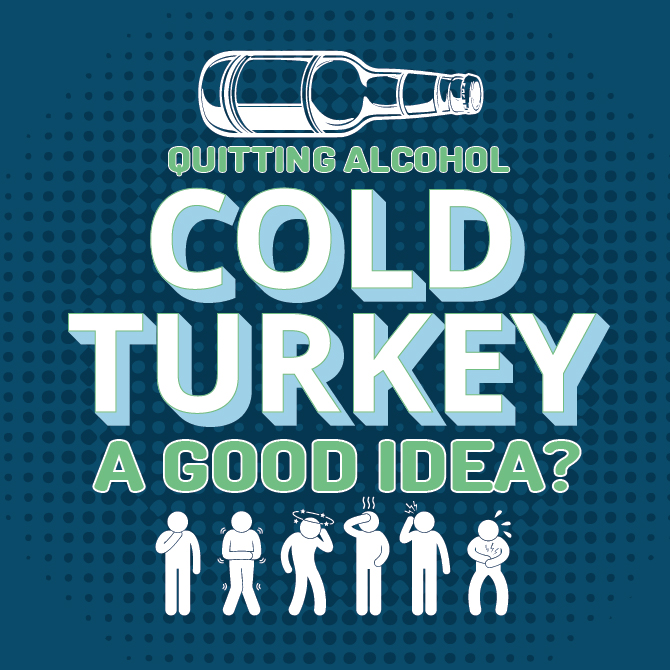
So you’ve been considering quitting drinking. Congratulations! Admitting you have a problem is always the first step towards recovery. However, you may be wondering what the next step is. Many people wonder if it is safe to put aside alcohol cold turkey-style, or if there is a better way to go about giving up your bad habit or addiction. We are here to give you the facts.
Consider Your Severity
Based on your level of use and dependence, quitting alcohol cold turkey can vary in difficulty. Some people whose addiction or bad habit has just begun can decide to quit, face a few days of uncomfortable recovery, and never look back. Others who may have been struggling with their addiction for longer periods of time, whose severity of use is greater than most, may experience painful withdrawal symptoms and cravings that make it a very difficult process to do it alone.
At the highest levels of addiction, quitting alone and all at once can be life-threatening without proper treatment. Many who are heavy drinkers start by slowly reducing the amount they drink over a period of time to lower the risk of dangerous side-effects and then choose to detox in the medical setting. Talk to your doctor, gauge your addiction level, and then make an informed decision on which path towards sobriety is best for you.
Prepare Yourself for Rough Days
If you do decide that your addiction level is mild and quitting cold turkey is right for you, then it is best to prepare for the rough days ahead. As withdrawal begins, whether you are quitting cold turkey or even just limiting your drinks, your body will tell you that it needs more alcohol in the form of cravings. Soon it will seem as if taking a drink is a better option than not, but it is not true. Be aware that you may face many of the following symptoms:
- Nausea
- Headaches
- Shakes
- Anxiety
- Insomnia
If you have a history of high blood pressure, heart disease, or experience any of the following severe symptoms, please seek medical attention immediately for detoxification:
- Seizures
- Mental Confusion
- Heart Arrhythmia or Other Disturbance
- Hallucinations
Because you are facing a difficult challenge, you may want to consider setting aside some of your sick days at work for the worst of it. The last thing you need is added work stress to the stress of quitting. Make sure you get plenty of rest, eat a balanced diet, and take the time to pamper and distract yourself over the course of your detoxification.
Be sure to eliminate any alcohol in your home so that you cannot give into temptation. Also, consider any triggers that may give you further cause to crave alcohol. Finally, make sure you have support from friends or family. If detoxification is not done within a medical facility, be sure to have loved ones checking up on you, not only to make sure you are okay, but for a morale boost as well.
Consider Getting Professional Help
If you are ready to give up alcohol for good, but don’t want to do it alone or are experiencing severe addiction, there are an abundance of excellent rehab facilities ready to help you with your addiction. DrugRehab.Org can help you find the perfect fit for your needs.
For mild cases, many detoxes are natural, with only the vitamin thiamin, healthy meals, and lots of water prescribed. This alone, with doctors monitoring, will help eliminate many of the detox symptoms and cravings.
For those who are heavily addicted, treatment is much more regimented. Doctors often prescribe benzodiazepines for detoxification, as they help with the anxiety that many addicts face as withdrawal symptoms hit. With close supervision, doctors are able to treat the various detox symptoms that arise, enabling the person to recover from alcohol addiction without any threat to their well-being.
DrugRehab.Org Can Help
If you don’t want to go through alcohol withdrawal and detoxification alone, you don’t have to. Contact us today for information on rehabilitation centers and treatment plans in your area.
